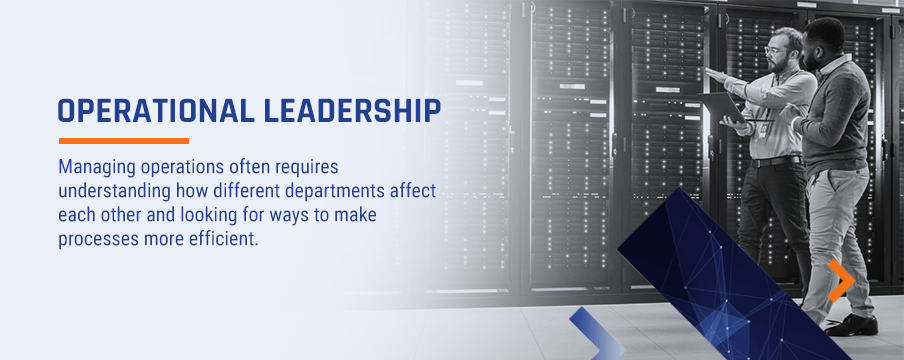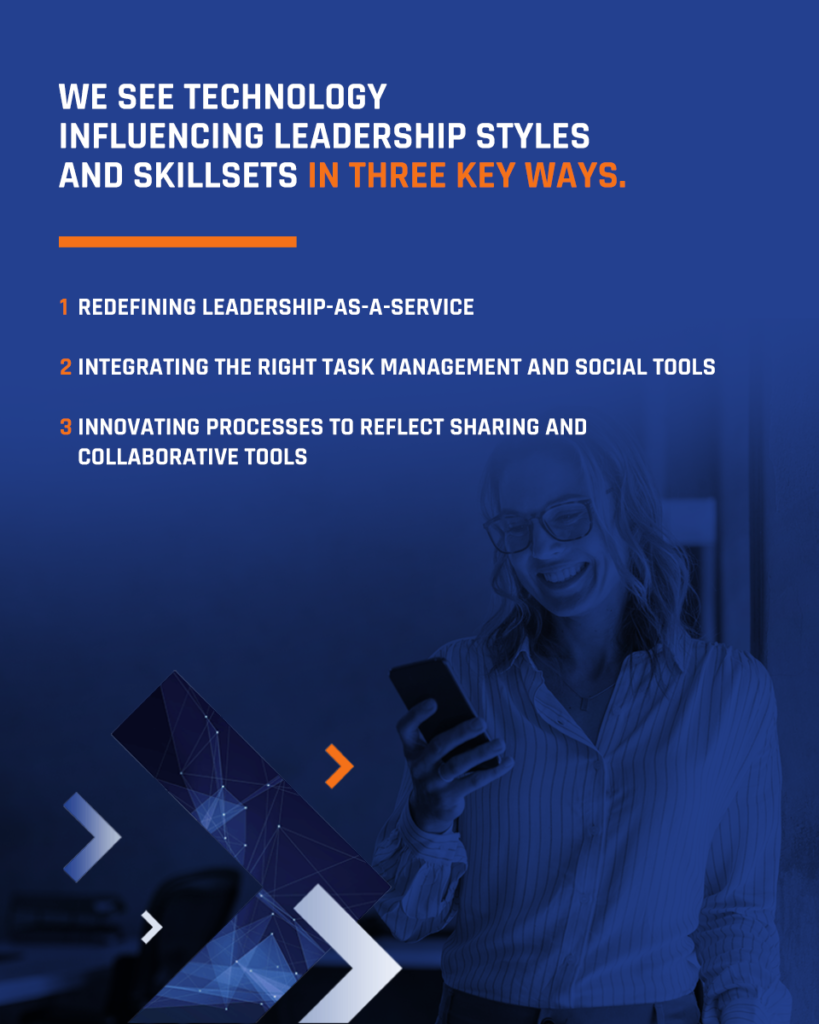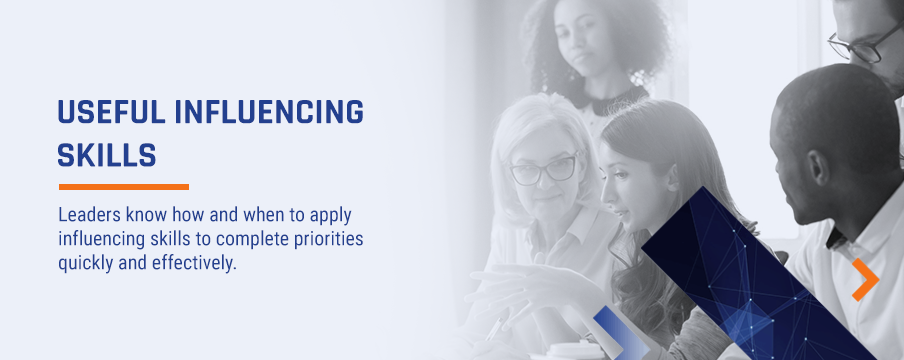How to Be a Strong Leader in a Technological World

While modern enterprise technology provides plenty of data for executive decision-making, the modern leader may not be using it to their full advantage. What’s more, it’s likely not even their fault. We’re facing a software inflection point, one where fourth-industrial-revolution tools continue to automate and analyze business information to the point of overload, with managers left to sort through the digital stacks.
It’s up to leaders to take advantage of the technology available. Regardless of your industry, department title or technological acumen, how can you stand out as a leader in a technological world — combining technology and leadership to build up your team, department and entire organization? We’re exploring what managers can do today to prime themselves for tech-fueled innovation and inspiration tomorrow, boosting their business savvy along the way.
The Current State of Leadership in a Technological World
Just as technology alters the workplace, it’s altering the way managers effectively run those workplaces. We’ve categorized the shifting norms into four leadership pillars, each representing a new domain or set of behaviors the modern manager should work to embrace.
1. Cognitive Leadership
Successful cognitive leaders are those with the ability to make sound, nimble decisions for their teams or organization based on objective data without becoming preoccupied with collecting data. Their savvy decision-making occurs both preemptively, through informed anticipatory changes, as well as when in-the-moment cases strike.
Inherent to the modern cognitive leader are data solutions informing that decision-making. Technology today allows unparalleled access to complete data repositories, alerts, case escalations and more, often in real-time. Modern cognitive leaders use:
- Data analytics programs and auto-generated reports to identify gaps, pain points and patterns in operations, markets, sales and more.
- Artificial intelligence to build better data sets and reports, which then trigger more intelligent and specific alerts.
- Enterprise resource planning (ERP) and comparable enterprise-wide management systems for round-the-clock visibility to core business functions.
True cognitive leadership today is less about obsessively tracking data and more about knowing what to do when it’s on your desk or screen. As transactional tasks and workloads continue experiencing automation, leaders have more time than ever to dedicate to data-backed cognitive decision-making.

2. Operational Leadership
Managing operations often requires understanding how different departments affect each other and looking for ways to make processes more efficient. Operational leaders embrace technology as a tool to augment and standardize key operations.
Standardization creates cohesion across products, services and internal processes; trims costs; reduces errors; and boosts brand reputation, among other benefits. Better yet, managers have more technology than ever at their disposal to cultivate operational excellence, including:
- Robotics in product assembly, service deliveries, warehousing, SKU management, transportation and many more business applications.
- Artificial intelligence tracking efficiency and productivity data to inspire improvements.
- 3D printing and modeling technology empowering product or service customizations with the same precision as standardized offerings.
- Blockchain for safer and more secure finance operations, accounting and bookkeeping.
- An Internet of Things (IoT) ecosystem harmonizing operational data across devices and locations.
3. Interpersonal Leadership
Interpersonal skills relate to how we interact with one another. Leaders with strong interpersonal skills listen to their teams and deal with problems or conflicts with empathy and diplomacy. Many of the finer details of these soft skills are tied to excellent communication.
Tech-savvy interpersonal leaders know the benefits — and the limits — of wielding cutting-edge communication technology. They use the right tools for the right situations, sharing, collaborating or relaying projects and information using appropriate mediums while nimbly switching between formats. That means adopting:
- Communication apps, such as Slack, Skype and Yammer.
- Digital project management tools, often with their own communication platform sub-integrations.
- Remote team management skills and best practices.
- Cultural competency in an increasingly diverse and geographically dispersed workforce.
- Online networking, personally and professionally engaging with others in meaningful, enriching and mutually rewarding exchanges.
4. Innovative Leadership
Innovative leadership in today’s tech-immersed world grounds company, department or team vision with actionable data and IT applications. Innovative leaders maintain a keen sense of evolving business processes through tech-guided strategic action plans and workflows that can bring plans to life.
The right tools and systems empower these strategic transformations — tools including:
- Agile management practices
- Collaborative and social online tools
- Task-based project apps
- Cloud applications

What This Means for Management Consulting
How are management consulting and similar services reshaped under the lens of technology? At Momentum, we see technology influencing leadership styles and skillsets in three key ways.
1. Redefining Leadership-as-a-Service
Management consulting today seeks to position leaders as mediators ready to empower and improve systems, not perform trickle-down blind directives. With technology automating and standardizing routine manual workflows, the very idea of leadership better fits that definition. Leaders pivot away from the pedantic into task orchestrators and enablers, there to align the right people with the right tools to get the right projects done — then remain on standby to assist when needed.
This is a fundamental shift in the nature of managers in the workplace. Leadership-as-a-service is a philosophy steering away from traditionally rigid, vertical hierarchies with little room for up-stream communication. Instead, leadership-as-a-service reimagines leadership into somewhat of an on-demand presence, guiding strategy yet truly empowering teams to work smarter, not harder.
2. Integrating the Right Task Management and Social Tools
Modern management consultants pay more attention to the tools and technologies deployed at their clients’ organizations. Often, these tools can make or break performance across teams and systems, so understanding them is critical when improving the whole.
When organizational leaders approach consultants to bolster facilitation, strategic planning and leadership skills, the consultants will survey collaborative and social enterprising applications. This gives sharp insight into a leader’s communication preferences, delegation skills and overall project-management styles, all of which are critical improvement domains in traditional management consulting.
3. Innovating Processes to Reflect Sharing and Collaborative Tools
Management consultants use surveys and sessions to help leaders understand all of their software application’s capabilities and their current uses. In other words, a management consultant today may deepen a client’s leadership skills by helping them better apply the tools and systems already in place to their team’s workloads.
In doing so, management consultants help create more functional — and more tech-innovative — internal methodologies to execute business processes. They may even identify new systems or tools for leaders to investigate to further streamline workflows and propel better task execution.
How to Be a Leader in a Tech-Seeped World
Managers looking to navigate tomorrow’s tech-saturated business world should consider cultivating these essential leadership skills and characteristics to empower their teams for future success.
1. Need for Technical and Interpersonal Competency
The right balance between interpersonal and technical acumen unlocks clearer communications with resources outside your specific domain. With so many developments in enterprise technology, leaders must fluently communicate their team’s tech to non-technical staff as well as outside leaders and colleagues. Better communication decreases silos and improves goal execution.
That ability to relay specialized information in a non-specialized way will only grow in importance. Perfecting this balance means fewer misunderstandings and office conflicts, greater intra-office relationships and, overall, more trust and credibility awarded to you and your team.
2. Ability to Coach and Mentor
Younger workers, in particular, crave career coaching and mentorship opportunities at their workplaces. Studies show a direct correlation between career mentorship and workplace satisfaction, as well as improved job performance, outputs and employee morale.
Mentorship also creates an organic exchange for performance feedback and expertise. Today’s performance-management tools allow mentors and mentees to set, assess, track and ideate performance improvements backed by data but delivered with a real, human connection. Leaders who can orchestrate relevant performance tracking parameters while still connecting with mentees beyond numbers go a long way in providing the kind of career coaching young workers want.

3. Solid Meeting Management
In a 2019 international “State of Meetings” report, almost half (44%) of workers said meetings prevent them from completing their work. The culprit? Poor meeting organization, including unclear actions as well as irrelevant attendees stalling functional progress.
Well-managed meetings respect everyone’s time. If improving leadership in a technological world is the goal, you need the right tools — and the right facilitation skills — to set up streamlined, purposeful group interactions. Ensure maximum meeting management with:
- Relevant and timely participant communication
- Proper meeting venue selection
- Functioning meeting technology
- Ample meeting material preparation
- Clear action-items on the meeting’s itinerary
- Summary of action items and delegation of work across attendees post-meeting
- Other business and meeting facilitation best practices
4. Useful Influencing Skills
Leaders know how and when to apply influencing skills to complete priorities quickly and effectively. They use solid judgment to orchestrate smooth communication between relevant parties, using the right channels and tools to connect the right people at the right time to answer questions, create action plans and gain project momentum.
With technology mediating more and more of these interpersonal interactions, a tech-savvy leader embraces how and when to exert influence, including how to:
- Use both verbal and non-verbal communication skills to nurture rapport and understanding.
- Deliver technical information to non-technical colleagues, and vice versa, using the most appropriate medium.
- Productively manage conflict via in-person and online communication contexts.
- Use tech tools to promote social and productive work environments, plus improve the wider workplace atmosphere.
5. Ability to Add Context
Enterprise technology today presents a staggering amount of data at our fingertips. What technology often doesn’t do, though, is give meaning to that data.
This is where tech leaders step in. Leadership in a technological world is increasingly defined by those who can extract information and lend context to data, helping leverage raw figures for impactful strategic change. Leaders can also communicate that data context to others in the organization, allowing teams to cross-coordinate on strategic changes more effectively and make ongoing updates. Machines today still lack the abstracting and imaginative capacities necessary to spearhead this kind of transformative advancement, but leaders have these abilities in abundance.
6. Adaptive and Flexible
The speed of technological advancements means today’s programs, software and equipment will likely be outdated in a few years. Given these shorter and shorter usage timelines, tech leaders must remain open-minded to incorporating new tools relevant to their team’s workloads. Their ability to forecast effective new team or department tools creates smoother implementation periods that don’t disrupt employee outputs or performance.
7. Consensus Management and Conflict Resolution
Workplace technology provides a space to mediate group decisions quickly and transparently, then manage the consequences of those decisions. Under this new landscape of using technology in leadership, leaders have more resources than ever to reach out for team opinions and facilitate final decision-making in a way that minimizes potential conflicts. This kind of tech-guided clear communication requires a contemporary leader who:
- Adopts communication channels and tools for consensus-building and democratic team decision-making.
- Pays attention to misunderstandings or miscommunications that can occur via online channels.
- Uses performance management and project tracking tools to benchmark activities and provide objective feedback in real-time.
8. Empowered Autonomy
The best managers give employees what they need to succeed. Technology has not changed this. Tech-inspired leadership only boosts the responsibility managers have to nurture and empower their teams, fostering a team of trusted staff using trusted tools to get their work done.
Tech leaders use clear reward systems, performance tracking and communication technology to boost feelings of purpose and growth among their employees. In other words, they use technology to be human-centric, letting software and hardware enable team creativity and autonomy rather than replace it.

How Momentum, Inc. Can Help You
The expert management consultants at Momentum work at the forefront of combining leadership and technology for strategically transformed organizations.
We partner with clients individually to cultivate key characteristics of tech leaders fitting their exact work environment, organizational culture and goals for process or business function improvements. Explore our branch of management and IT consulting services to see how we can do this for you.
1. Improved Business Facilitation
Momentum’s business facilitation service lends enhanced structure, focus and efficiency to time-strapped business leaders who want one less task on their shoulders.
Using the best automated management tools and technology, we take care of meeting logistics so you can take care of arranging and executing core business goals. With an outsourced, tech-guided facilitation service, you receive:
- Agenda-setting and core meeting objectives
- Meeting design and orchestration
- Venue or location coordination
- Attendee communications
- Material preparation
- And more, based on your meeting’s purpose and itinerary
2. Data-Driven Strategic Planning
Work smarter, not harder, with your enterprise data to create tailored, actionable goals for your organization.
Momentum’s strategic planning consulting presents a unique, three-part process of uncovering improvements to your current strategic-planning methods. Leaders learn assessment, goal-setting and execution best-practices guided by technology to set and communicate organizational goals better, then watch the positive results unfold.
3. ERP Audits and Integration
Momentum’s IT consultants take your tech leadership to the next level with ERP implementation consulting and support. ERP is one of the most important tools in your management arsenal, and ERP consulting empowers unprecedented visibility across operations and business functions. Consulting allows you to see inefficiencies, redundancies, pain points and waste leading to increased risk — then remedy them before it’s too late.
4. IT Project Management
Harmonize your IT ecosystem while establishing a unified approach to project execution through our multi-layer project management services.
Momentum can assist you in creating or improving your organization’s project management methodology (PMM) or formal project management office (PMO) — both contemporary best-practices in smoother, speedier and cost-effective project management. We also provide broader project management consultation and mentorship, ensuring your technology and IT tools don’t go to waste when taking your business goals from ideas to reality.
Use Technology to Be a Better Business Leader
Give your team the tools they need to get their work done faster and easier — then reap the rewards of a well-oiled department.
Momentum’s management consulting services can help you do that, and more. Contact us for details on our expert analysis and consulting services that have brought personalized — and measurable — results to government agencies, private businesses, nonprofits and more.
Sources:
- https://www.hrtechnologist.com/articles/mobile-workforce/3-best-practices-for-managing-remote-teams/
- https://www.m-inc.com/article/13-signs-you-should-invest-in-project-management/
- https://www.cio.com/article/3254744/technologies-that-will-disrupt-business.html
- https://onlinelibrary.wiley.com/doi/abs/10.1002/lia.1279
- https://www.inc.com/peter-economy/a-new-study-of-19000000-meetings-reveals-that-meetings-waste-more-time-than-ever-but-there-is-a-solution.html
- https://www.m-inc.com/services/management-consulting/business-facilitation/
- https://www.m-inc.com/services/implementation-support/erp-implementation/
- https://www.m-inc.com/services/project-management/
- https://www.m-inc.com/services/
- https://www.m-inc.com/who-we-serve/clients/
 Tap to email
Tap to email
